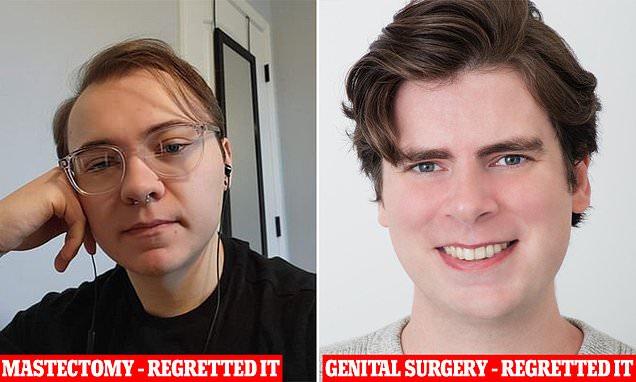
Gay teenagers disturbed by their own sexuality have described deciding life would be better as a transgender person and undergoing surgery – only to regret it several years later.
The young people said that, in hindsight, drastic surgical operations were offered with insufficient discussion or thought. Their stories emerged as concern grows that so-called gender-affirming care for children is homophobic, as it permanently changes the bodies of children and young adults who are not transgender, but merely trying to come to terms with their sexuality.
One told of being abused online by trans rights activists when, after five years living as a trans man, they realized they wanted to revert to being a lesbian woman.
Another, who began transitioning from male to female at the age of 15, now campaigns for a ban on surgical intervention under 25 for anyone who has not had psychotherapy first.
Yet another, growing up as a lesbian in a conservative community, convinced herself life would be easier as a trans man and had a double mastectomy – only to revert to living as a woman six years later.
Studies cited by The New York Times showed that many teenagers wrestling with their identity and sexuality ultimately found peace: 80 percent of childhood gender dysphoria resolve themselves by puberty, and 30 percent of people on hormone therapy discontinue its use within four years, the paper said.


The effects of the hormone therapy, including infertility, are, however, often irreversible.
Kasey Emerick, a 23-year-old woman and detransitioner from Pennsylvania, told The New York Times she saw living as a trans man as a better alternative to being a gay woman.
‘I transitioned because I didn’t want to be gay,’ she said. ‘I believed homosexuality was a sin.’
Emerick, who grew up in a conservative Christian church, told her mother at 15 that she was gay.
Her mother told her it was likely a response to her father, who was convicted of raping and assaulting her repeatedly from the ages of four to seven.
At 16, Emerick was caught texting a girl, and her mother took her phone away: Emerick was then admitted to a psychiatric hospital.
Emerick convinced herself inside the hospital: ‘If I was a boy, none of this would have happened.’
She said she found trans advocacy websites online, and felt she could ‘pick the other side.’
At 17, after two 90 minute consultations, she was cleared for a double mastectomy – despite the anxiety, depression, suicidal tendencies, panic attacks and ADHD she was also suffering.
‘I’m thinking, ‘Oh my God, I’m having my breasts removed. I’m 17. I’m too young for this,’ she recalled, but said she went ahead with the operation.
‘Transition felt like a way to control something when I couldn’t control anything in my life,’ she told the paper.
Emerick lived as a trans man for five years, but then realized she was no happier, and began detransitioning – despite online threats from trans activists.
‘I thought my life was over,’ she said. ‘I realized that I had lived a lie for over five years.’
One man, Paul Garcia-Ryan, lived as a woman from the age of 15 to 30, undergoing bottom surgery.

He has detransitioned and is now, aged 32, a psychotherapist in New York, treating young people who suffer from gender dysphoria.
Garcia-Ryan told The New York Times he believes no one under the age of 25 should be allowed surgical procedures unless they have seen a psychotherapist.
He said he was driven to identify as a trans woman because he could not countenance being a gay man.
‘It was much less threatening to my psyche to think that I was a straight girl born into the wrong body — that I had a medical condition that could be tended to,’ he said.
He said that, when he sought medical help aged 15, the clinic immediately confirmed his own thoughts, rather than challenging them.
He said he had surgery in college, but suffered severe complications from the surgery and hormones, which made him reconsider his decisions.
‘You’re made to believe these slogans,’ he said. ‘Evidence-based, lifesaving care, safe and effective, medically necessary, the science is settled — and none of that is evidence based.
‘When a professional affirms a gender identity for a younger person, what they are doing is implementing a psychological intervention that narrows a person’s sense of self and closes off their options for considering what’s possible for them.’

Grace Powell, who grew up in a conservative community in Grand Rapids, Michigan, said that she became convinced that her sexuality would be ‘solved’ by living as a trans man.
She had a double mastectomy the summer before college, then went off as a transgender man named Grayson to Sarah Lawrence College.
Powell, now 23 and detransitioned, told The New York Times she wished more questions were asked before she opted for the life-altering procedures.
‘I wish there had been more open conversations,’ she said.
‘But I was told there is one cure and one thing to do if this is your problem, and this will help you.’
Aaron Kimberly, a 50-year-old trans man living in British Columbia, transitioned at the age of 33, and lives happily as a man.
But he said he left his job at a clinic treating gender-dysphoric young people because he felt there was not enough emphasis on mental health treatment, before surgical options or hormones.
He then founded the Gender Dysphoria Alliance and the L.G.B.T. Courage Coalition, to advocate better gender care.
‘I realized something had gone totally off the rails,’ he said.



